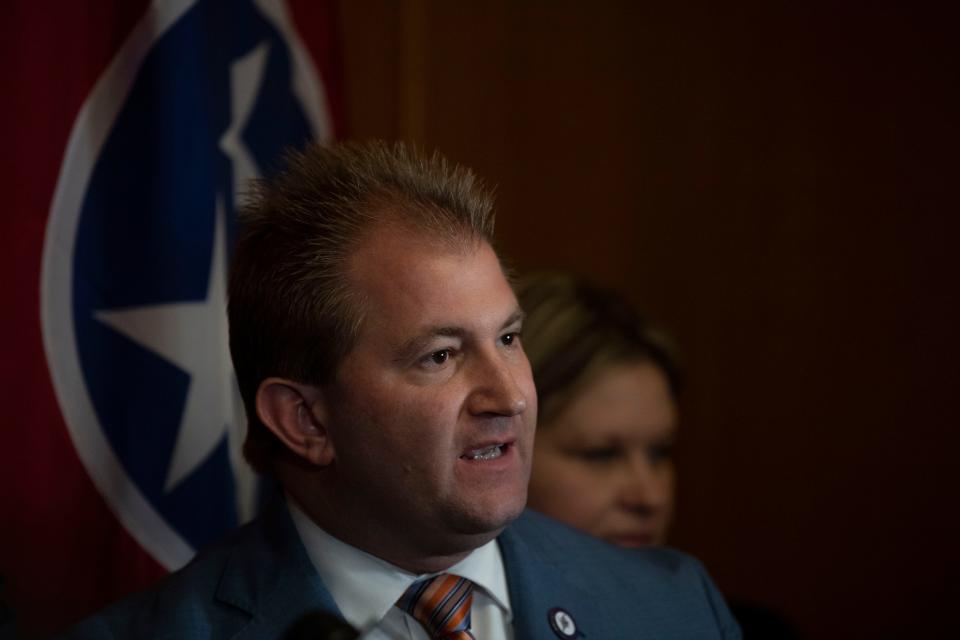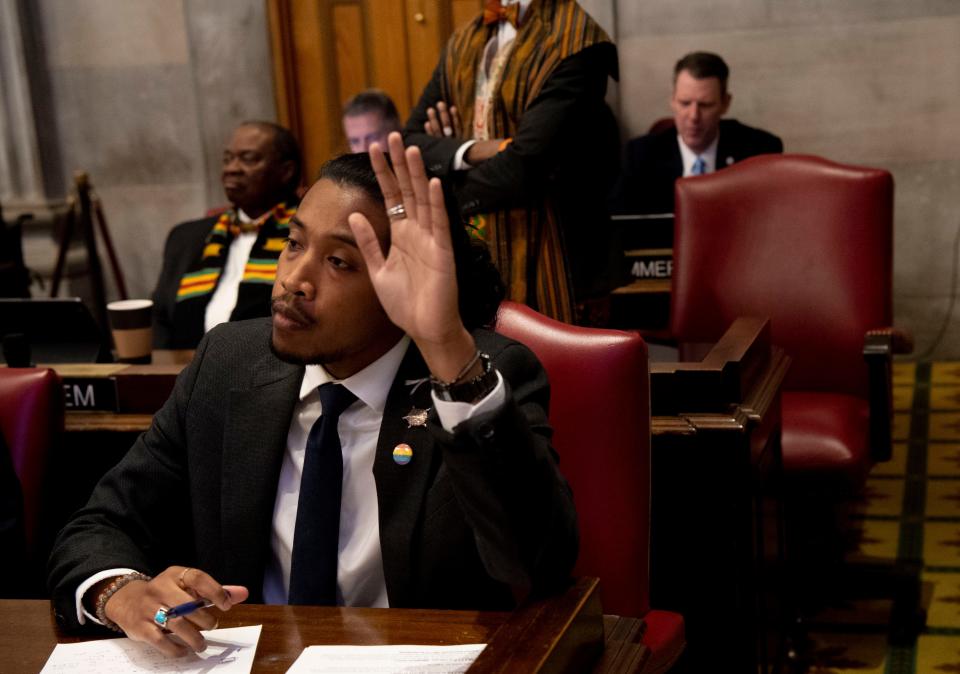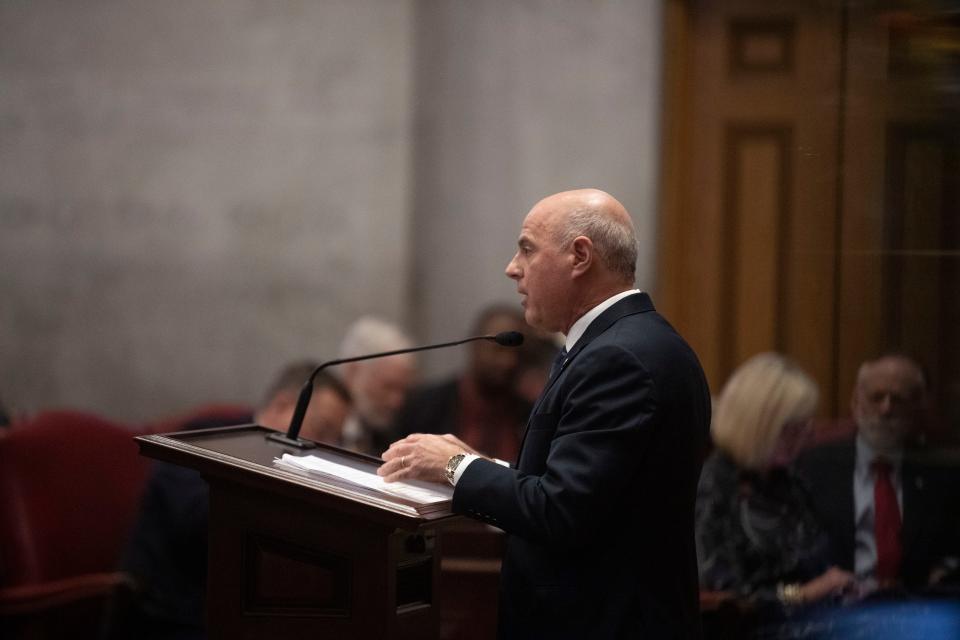The week in politics: Major legislative issues head for conference committee clash
Another week of the General Assembly session has passed without a vote on Gov. Bill Lee's school voucher proposal.
The differing House and Senate plans were up for committee hearings midweek, but both were delayed for a third week in a row as the end of session looms ― particularly for those lawmakers facing primary challenges they can't fundraise for until after adjournment.
"It is the homestretch, so within the next week, we'll know whether or not this bill comes together between the House and the Senate, but I feel good about it right now," House Majority Leader William Lamberth told reporters on Thursday.

As negotiations continue, the House and Senate appear to be at an impasse on key points of the legislation. Lt. Gov. Randy McNally, R-Oak Ridge, told reporters he hopes the two chambers will be able to reconcile before the end of session.
"What's important to us, of course, is the testing, and making sure we're not going to go back on testing and accountability," McNally said. "Also, we tend to like the Senate version the best, which would save somewhere around $70 million. But we understand that the House might want to spend up to what the governor has in the budget to do some things for teachers."
Lamberth stressed the importance of the investments in the House version for public schools.
"We want to do as much as we possibly can to help improve education overall in Tennessee ― we're talking $144 million for scholarships, $8.5 billion ― with a B ― for K-12 public education. That's big," Lamberth said. "If we're going to spend that kind of money on public education, then we should be doing things like reducing unnecessary testing, reducing unnecessary evaluations for rock star teachers. ... We want to improve education, period. So hopefully the Senate gets there."
Meanwhile, the clock is ticking toward the end of session. On Monday, the House will take up "flow motion," essentially a lighting round in the legislature when the rules are suspended and legislation can move quickly through a process that normally takes weeks.
The governor told reporters Thursday that he has been meeting regularly with lawmakers about his signature legislation, and he "feels like they're close" to a resolution but offered no specifics on negotiation conversations.
"I'm very encouraged and very confident that we are going to move forward with the legislation," Lee said. "There's a broad understanding of the General Assembly that Tennesseans believe that parents should have more choice when it comes to their children's education. ... They're working really hard to give those parents that choice."
House Democratic Caucus Chairman John Ray Clemmons said Democrats hope the voucher bill is "on the ropes" as Republican negotiations continue behind closed doors, but he acknowledged deals often get "cut late at night" at this stage in session.
"I would encourage the citizens of Tennessee who truly value public schools and support our public schools to sleep with one eye open, because a lot of stuff will happen up here late at night," Clemmons said.
Franchise tax rebate transparency 'make or break' for House leaders
A $1.9 billion franchise tax reform and refund seems destined to be hashed out in conference committee, after the Senate voted Thursday morning not to concur with the House version ― which offers fewer retroactive refunds and would require businesses who receive refunds to have their names and refund amounts disclosed as public record.
McNally, R-Oak Ridge, said Thursday he expects the transparency issue to be among the differences ironed out in conference committee.

But House leaders say the transparency measure is a make-or-break element of the legislation for them.
"If we're going to spend however much money of your dollars ― our bill is $800 million and their bill is $1.57 billion ― then the people of Tennessee deserve to know where their tax dollars are going in a rebate," Lamberth said. "It's a very, very unique circumstance where we're granting an extraordinary rebate here. The people of Tennessee should know the names of the companies that are getting a rebate."
The National Federation for Independent Businesses is opposing public disclosure of businesses receiving a rebate, arguing that it would constitute illegal disclosure of confidential taxpayer information, according to NFIB Director Jim Brown.
The Council on State Taxation sent a letter to House Finance Committee members earlier this month, requesting that lawmakers keep names of businesses receiving a refund private. In the letter, COST Executive Director Patrick Reynolds said the House provision "would neither inform the public policy debate nor raise additional revenue" but instead would "facilitate the harassment of individual corporations."
Of the estimated 100,000 businesses that would be eligible for a rebate under the proposal, 62% of the refund claims would be for $5,000 or less and 98% of the total number of claims would be for amounts $50,000 or less, according to NFIB.
Sen. Heidi Campbell, D-Nashville, who last month proposed a wider-ranging amendment aimed at transparency that Republican colleagues voted down, said she hopes to see transparency measures the House added stay in the bill.
"Tennesseans need to know where their tax dollars are going, especially since we voluntarily decided to give Tennesseans' tax dollars back to corporations," Campbell said.
Jones opponent files petition challenge
Republican House candidate Laura Nelson wants to challenge the qualifying petition of Rep. Justin Jones, D-Nashville, in the District 52 race.
Nelson's campaign informed the Davidson County Election Commission Thursday it was challenging Jones' qualifying signatures, though election administrator Jeff Roberts told The Tennessean the Nelson campaign did not provide specifics on what exactly it was challenging.

Roberts said his office has requested further information on the challenge. If the challenge advances, the commission would hold a hearing where both sides could argue their positions.
Though it's not yet clear what specific grounds Nelson hopes to challenge the petition on, Jones may be in a difficult position: He only submitted 26 signatures on his petition, just one more than the minimum of 25.
Roberts confirmed one signature had already been struck after officials determined the signator did not live in the district, leaving Jones with no room for error on his remaining 25 signatures.
Bulso argues for cousin marriage
Rep. Gino Bulso, R-Brentwood, raised eyebrows in the House on Thursday as he attempted to amend a bill making marriage between first cousins illegal, in part arguing the bill would violate constitutional case law legalizing gay marriage.
Bulso unsuccessfully brought an amendment to allow marriage between two first cousins if they receive genetic counseling, arguing the only state interest in blocking cousin marriage is public health concerns about an increased risk of genetic abnormalities in the offspring of a genetically related couple.
But Bulso, a trial lawyer by training, tried to suggest the bill would be discriminatory against gay couples if the only state interest was preventing reproduction.

Rep. Darren Jernigan, D-Nashville, seemingly baffled by Bulso's argument, pointed out several states have long had laws on the books blocking cousin marriage, none of which have been found to be unconstitutional, and the proposed would not treat gay or straight couples differently.
In a rare move, the majority of House Republicans joined Democrats to block Bulso's amendments, and Jernigan's bill passed almost unanimously. Bulson and Rep. Monty Fritts, R-Kingston, voted against the bill, with a handful of Republicans declining to record a vote on the measure.
In a previous committee hearing on the bill, Bulso said his grandparents were first cousins who came to Tennessee to marry.
Senate passes bill to require age verification for porn sites
Tennessee senators this week unanimously passed Senate Bill 1792, which would require porn websites to verify all users are 18 or older before providing access to explicit content.
Age verification would require submission of a U.S.-issued photo ID or a similar method. Failure by websites to verify age would be a Class C felony, punishable by three to 15 years in prison and fines of up to $10,000. The attorney general would be empowered to bring legal action against companies who fail to do so.
The bill is behind the budget in the House. If successful, it would take effect Jan. 1, 2025.
Eight states currently have age verification laws in effect, including North Carolina, Virginia, Arkansas and Mississippi, and 16 more are considering similar bills this year.
Ogles opponent withdraws
A Republican primary candidate challenging U.S. Rep. Andy Ogles, R-Columbia, plans to withdraw from the race, just a few days after the qualifying deadline.
Tom Guarente, a Brentwood cybersecurity executive, will step aside, leaving the GOP primary for incumbent Ogles and Metro Nashville Council member Courtney Johnston.
In a statement, Guarente said the 5th Congressional District and "the Republican party as a whole deserve a new representative in Congress," suggesting he'd back Johnston's bid to unseat Ogles.
"There’s an old saying about doing something for the greater good," Guarente said. "Today, I am doing just that. Despite receiving generous financial and moral support from countless Tennesseans, I have decided not to run for Congress in TN-05 this election cycle. My decision follows prayer and discussion with those I trust and respect. Ultimately, I am choosing not to fracture the party."
Hagerty attends White House state dinner
Republican U.S. Sen. Bill Hagerty attended a state dinner at the White House hosted by President Joe Biden and First Lady Jill Biden to honor Japanese Prime Minister Fumio Kishida and his wife.
Hagerty served as ambassador to Japan in the Trump administration. He sponsored a resolution honoring Kishida’s visit to the United States this week.
Also among the invited guests were Nashville businessmen Bill Freeman and Tom Loftis.
Hagerty's office did not respond to a request for comment.
Catch up on the week:
Covenant families file ethics complaint against state Sen. Todd Gardenhire
Senate passes bill to criminalize supporting minors seeking abortions
The Senate passed a bill to allow armed teachers. What happens next?
New Beacon Center poll measures impact of Taylor Swift on Tennessee politics
Senate passes bill to allow death penalty in child rape cases
House passes version of massive franchise tax refund at odds with Senate
Republican lawmakers question education commissioner’s credentials
Bill to require age-appropriate gun training in schools goes to governor’s desk
Tennessee elections: Who is qualified to run in the 2024 primary elections?
Got a question for us?
Got a question about state politics you would like us to tackle? Let us know. Email us at [email protected], [email protected] or [email protected].
This article originally appeared on Nashville Tennessean: House, Senate disagree on Tennessee school vouchers bill
